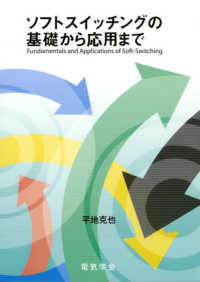- ホーム
- > 洋書
- > 英文書
- > Politics / International Relations
Full Description
Democratization is the most comprehensive volume on this critical field of contemporary politics, with insightful coverage of the key theories, actors, dynamics, and developments. This authoritative guide brings together leading experts from diverse international backgrounds, including some of the best known names in the field, making it an invaluable resource to students of democratization.
This second edition reflects the dramatic changes in today's political world, with empirical coverage of developments on every continent. It considers the role of new technologies, including a dedicated chapter on social media and democratization, as well as the resilience of authoritarianism and renewed antidemocratic tendencies in many parts of the world.
The book is accompanied by a range of online resources designed to support both students and lecturers.
For students:
- Revise key terms and test your knowledge of terminology from the book with our digital flashcard glossary.
- Expand your knowledge of key developments in world affairs with additional case studies.
- Take your learning further with links to reliable web content and relevant OUP journals.
For registered adopters of the textbook:
- Guide class debate with suggested seminar questions and activities.
- Adapt PowerPoint(R) slides as a basis for lecture presentations, or use as handouts in class.
Contents
1: Christian Welzel, Ronald Inglehart, Patrick Bernhangen, and Christian W. Haerpfer: Introduction
Part One: Theoretical and Historical Perspectives
2: Christian Welzel: Theories of Democratization
3: Richard Rose: Democratic and Undemocratic States
4: Patrick Bernhagen: Measuring Democracy and Democratization
5: Dirk Berg-Schlosser: Long Waves and Conjunctures of Democratization
6: John Markoff and Daniel Burridge: The Global Wave of Democratization
Part Two: Causes and Dimensions of Democratization
7: Hakan Yilmaz: The International Context
8: Patrick Bernhagen: The Political Economy of Democracy
9: Christian Welzel and Ronald F. Inglehart: Political Culture, Mass Beliefs and Value Change
10: Pamela Paxton and Kris Velasco: Gender and Democratization
11: Natalia Letki: Social Capital and Civil Society
12: Federico M. Rossi and Donatella della Porta: Social Movements and Contention in Democratization Processes
Part Three: Actors and Institutions
13: Ian McAllister and Stephen White: Conventional Citizen Participation
14: Leonardo Morlino: Political Parties
15: Matthijs Bogaards: Institutional Design in New Democracies
16: Katrin Voltmer and Gary Rawnsley: The Media
17: Larry Diamond and Zak Whittington: Social Media
18: Laura Jakli, M. Steven Fish, and Jason Wittenburg: A Decade of Democratic Decline and Stagnation
Part Four: Regions of Democratization
19: Richard Gunther: Southern Europe
20: Andrea Oelsner and Mervyn Bain: Latin America
21: Christian W. Haerpfer and Kseniya Kizilova: Post-Communist Central and Eastern Europe Europe
22: Christian W. Haerpfer and Kseniya Kizilova: Post-Soviet Eurasia
23: Francesco Cavatorta: The Middle East and North Africa
24: Michael Bratton: Sub-Saharan Africa
25: Doh Chull Shin and Rollin F. Tusalem: East Asia
Part 5: Conclusions and Outlook
26: Christian Welzel, Ronald F. Inglehart, Patrick Bernhagen, and Christian Haerpfer: Conclusions: The Future of Democratization







